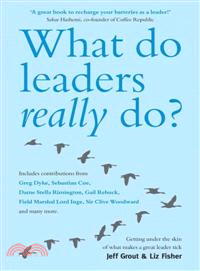| FindBook |
有 1 項符合
WHAT DO LEADERS REALLY DO? - GETTING UNDER的圖書 |
 |
What Do Leaders Really Do? - Getting Under The Skin Of What Makes A Great Leader Tick 作者:GROUT 出版社:JOHN WILEY & SONS 出版日期:2007-08-10 規格: / 224頁 |
| 圖書館借閱 |
| 國家圖書館 | 全國圖書書目資訊網 | 國立公共資訊圖書館 | 電子書服務平台 | MetaCat 跨館整合查詢 |
| 臺北市立圖書館 | 新北市立圖書館 | 基隆市公共圖書館 | 桃園市立圖書館 | 新竹縣公共圖書館 |
| 苗栗縣立圖書館 | 臺中市立圖書館 | 彰化縣公共圖書館 | 南投縣文化局 | 雲林縣公共圖書館 |
| 嘉義縣圖書館 | 臺南市立圖書館 | 高雄市立圖書館 | 屏東縣公共圖書館 | 宜蘭縣公共圖書館 |
| 花蓮縣文化局 | 臺東縣文化處 |
|
|
- 圖書簡介
An enormous range of literature on leadership and management theory has been produced over the years, some of it highly academic and much of it contradictory. What Do Leaders Really Do? takes the basis of the best-known management theories to see how they fit with the practical reality of leadership. How do leaders spend their time? Are they really preoccupied with strategy, vision and inspiring people? Do they lead by accident, or design? The book challenges the assumption that leaders are born, not made and explores the theory that female leaders are fundamentally different from their male counterparts. What Do Leaders Really Do? Looks into the everyday working lives of well-known leaders in a variety of fields - business, sport and the armed forces - in order to identify the elements that encourage people to follow where they lead. Drawing on the experiences of a wide range of leaders with varying backgrounds and roles, as well as a range of respected academics and management writers, this book will closely analyze the background, experiences and behavior of a diverse set of leaders. A central part of the analysis will be a detailed examination of what these leaders do on a day-to-day basis. It is not a book about management theory but an accessible, no-nonsense guide to those theories and how they translate to real life. Many people lead effectively without knowing how they do it; this book will isolate and identify the core skills and behavior displayed by effective leaders. What Do Leaders Really Do? is intended to be a refreshing alternative to the hundreds of academically-oriented leadership books that are available. The tone will be straight-forward, accessible and sometimes humorous, rich with first-person evidence and anecdotes. It will dissect popular leadership theory into the easily understandable basics, with reference to the practicalities of real-life leadership situations. After all, what good is theory if it doesn't work in practice?
- 作者簡介
Jeff Grout is a respected adviser, commentator and columnist on the subjects of motivation, recruitment and retention. He is a regular speaker at conferences and events, specialising in topics such as Building high-performance teams and The characteristics of success. He is also business manager to Clive Woodward, the former England Rugby coach. Jeff is an experienced television and radio participant and has collaborated with the BBC in producing an interview training video. He has also run interview technique courses for a number of the UK's leading companies. Jeff is co-author of Mind Games, The Adventure Capitalists and My Brilliant Career, which insights into the characteristics of career success, based on public interviews with high achievers from the fields of sport, business media and the stage.
Liz Fisher is a freelance journalist and writer, contributing regularly to many business and professional magazines. During her twenty years as a business journalist, she has interviewed leaders in a range of fields, from the RAF to the RSC. She is co-author of The Bluffer's Guide to Accountancy and author of Brand Identity in Retail Financial Services and a careers guide for young accountants. - 名人/編輯推薦
“One of the best new books gathering insights into leadership styles from a range of successful people...” (Financial Director, October 2007)
"You will find stories that resonate and "stick" with you." (People Magazine, October 2007) - 目次
Foreword.
Introduction.
Acknowledgements.
Part One.
1 Characteristics of Leadership.
The charisma question.
A substitute for charisma.
Leadership by osmosis.
2 Background.
The infl uence of family life.
Education.
Learning leadership.
Career progression.
3 Infl uences.
The infl uence of parents.
The infl uence of teachers.
The infl uence of bosses.
Mentors and mentoring.
Part Two.
4 Vision.
Creating the vision.
Communicating the vision.
Long or short term?
5 Decision-making and Risk.
Military mission analysis.
Risk and the military.
Risk and business leaders.
6 Mistakes and Setbacks.
Learning from experience.
Analysing failure and success.
7 Change Management.
Why do most change initiatives fail?
Communicating change.
Culture change.
Early days, quick wins.
Part Three.
8 Empathetic and Authentic Leadership.
Empathetic leadership.
Caring leadership.
Sensing mood.
Delivering bad news.
Authentic leadership.
The stories people tell.
Visibility.
Keep your distance.
9 Motivation, Inspiration and Morale.
Celebrating successes.
Morale.
Inspirational leadership.
The role of oration.
10 Choosing and Building a Team.
The power of diversity.
Trust.
Developing future leaders.
Preparing for success.
Teamship rules and professionalism.
Team spirit.
11 Communication.
Too much talk?
Authentic communication.
Honesty and integrity.
Communicating outside the company.
Dealing with the media.
12 Looking After No 1.
Creating space to think.
Self-improvement and learning.
Recommended reading.
Leadership and lifelong learning.
Knowing when to quit.
Final thoughts on leadership.
Appendix.
Bibliography and Further Reading.
Index.
70個馬上套用的賺錢模式:半夜賣榻榻米、貴五倍的衛生紙、不怕你暴雷的試閱……這些獲利模式怎麼想出來的?現役行銷大師破天荒給你思考加速器。
基恩斯的再現性工作技術:平均年薪超過兩千萬日圓的人怎麼工作?基恩斯員工不靠運氣而是建立模式、複製成果,成為再現性人才。
攀高、續抱、快逃—K線之道:股票要漲,不能純靠題材,更需要資金拉抬。K線比財報早知道,賺到70%漲幅。
50張圖秒懂勞動權益:你在職場走跳,從求職到離職絕對不挨刀!
別讓主力賺走你的錢:115張技術圖表,買在最低風險,決定超級獲利(熱銷再版)
急性子的不累工作法:回郵件超快、喜歡多工進行、不喜歡等人更不讓人等,事事求快當然好,但如何不累不氣還兼顧品質?
當你沒有新鮮的肝-不當主管你會更累:怕累、怕煩、不想扛責?35年資歷的人資主管分享,為何你在45歲前,該逼自己當個清、濁二刀流主管!
2024年臺灣IT Spending 調查:金融業
犬性思維:讓銷售變簡單
|











